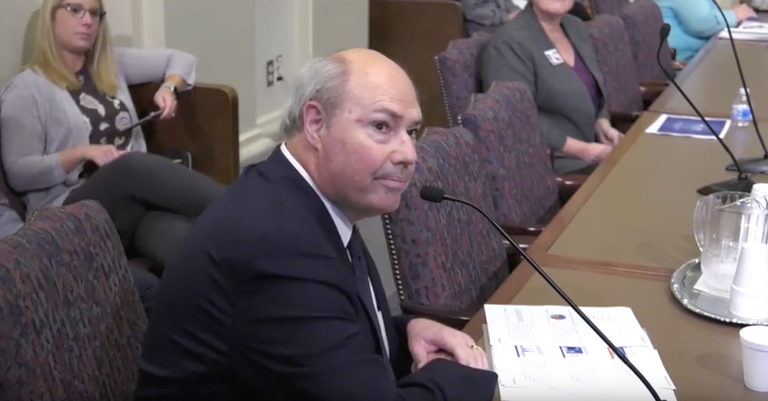
Health Care
Ray Carter | September 6, 2019
Expert: To improve health, improve education
Ray Carter
If lawmakers want to improve health outcomes in Oklahoma, one way to generate significant progress is to improve education outcomes, one expert recently told members of the legislative Healthcare Working Group.
“Education, from my assessment of the evidence, is a fundamental cause and driver of our health outcomes,” said Dr. Gary Raskob, dean at the OU College of Public Health.
Much of the relationship between educational attainment and health outcomes makes intuitive sense. Those who obtain a good education are able to obtain better-paying jobs with quality health insurance and are also more likely to make informed health decisions.
“Health and education are intricately connected, very significantly, and they’re not different things,” Raskob said.
Among cities nationwide, Tulsa and Oklahoma City rank 96th and 98th, respectively, for life expectancy of individuals with incomes in the bottom quartile. That places Oklahoma’s two major metros below Detroit.
But for individuals at the top quartile, the two cities’ ranking is much higher.
“We’re not in this bad data for our people in higher incomes, okay?” Raskob said. “It’s not something special about Oklahoma that we’re always in the bottom.”
Even when one looks only at Oklahoma County, he noted there is an 18-year difference in average life expectancy when comparing the poorest zip code to the county’s least poor zip code.
“That’s striking,” Raskob said. “That is like the difference between the United States and developing countries in Africa. That should not be occurring in our country in 2019.”
For those working to improve educational options for Oklahoma’s low-income families, Raskob’s findings are not surprising.
“A lot of folks realize that education, getting a college degree or at least getting college-and-career ready by the time you graduate high school, sets you up not to struggle as much financially,” said Philip Abode, executive director of Crossover Preparatory Academy, a private school which serves predominantly low-income minority students in north Tulsa. “If you have solid employment, then you’re more likely to have quality health insurance. If you have quality health insurance, you’re more likely to go to the doctor when things aren’t okay. I would say a lot of our families see education as a means to an end for their kids, and it’s not just education for education’s sake.”
Robert Ruiz, executive director of ChoiceMatters, an organization that works to increase parent awareness of educational choices in Oklahoma, said the lack of quality schools for people in Oklahoma’s poorest areas traps them in categories that have the worst health statistics and life outcomes.
“We talk about mobility,” Ruiz said. “Place like inner-city Oklahoma City, I think, has about a 5-percent mobility rate. In other words, if you are born in poverty, you are only 5-percent likely to get out of poverty. And of course, education plays a huge role in that.”
Legislation filed this year would have increased educational opportunity for many children living in the circumstances and zip codes highlighted by Raskob’s presentation.
The Oklahoma Equal Opportunity Education Scholarship Act provides a tax credit to businesses and individuals who donate to organizations that provide private-school scholarships. The program also provides tax credits to those who donate to public-school programs.
Current law caps the amount of tax credits that can be issued, and the cap has been reached in recent years. Senate Bill 407, by Sen. Dave Rader and Rep. Jon Echols, would raise the cap to allow $15 million in tax credits for both parts of the program for a total of $30 million in tax credits annually.
It is estimated that SB 407 will allow up to 5,000 more children to benefit from privately-funded scholarships and inject up to $27 million in private funding into traditional public schools. The bill could receive a vote when the Legislature reconvenes in February.
For the children who would receive scholarships if SB 407 passes, the benefits could extend a lifetime and impact all areas of a child’s life, health included, Rader said.
“Those would be the thoughts for my children,” Rader said. “I don’t think my thoughts would be off from anybody else.”
But without increased educational choices, some officials say Oklahoma’s health outcomes may remain mired in the national cellar along with other comparable rankings.
“It’s kind of this spiral,” Ruiz said. “Poverty is something that is supposed to be transitory. It really shouldn’t be something that somebody is stuck in. But if you don’t even get access to the great equalizer, which is education, then you don’t even have the opportunities to be able to do that. We talk a lot about equity as far as access to opportunities. And unfortunately for a lot of our inner-city youth, they’re not getting that access to opportunities.”

Ray Carter
Director, Center for Independent Journalism
Ray Carter is the director of OCPA’s Center for Independent Journalism. He has two decades of experience in journalism and communications. He previously served as senior Capitol reporter for The Journal Record, media director for the Oklahoma House of Representatives, and chief editorial writer at The Oklahoman. As a reporter for The Journal Record, Carter received 12 Carl Rogan Awards in four years—including awards for investigative reporting, general news reporting, feature writing, spot news reporting, business reporting, and sports reporting. While at The Oklahoman, he was the recipient of several awards, including first place in the editorial writing category of the Associated Press/Oklahoma News Executives Carl Rogan Memorial News Excellence Competition for an editorial on the history of racism in the Oklahoma legislature.